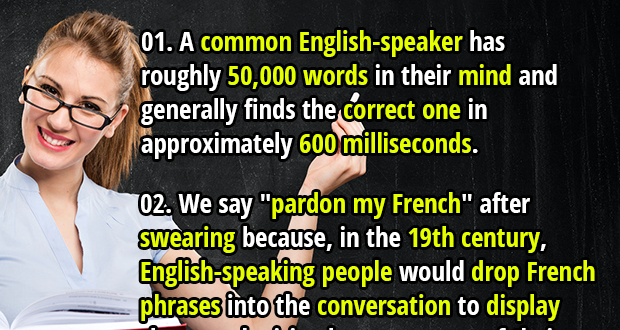1Pilots

English is the universal "language of the skies". All pilots must learn and speak English, regardless of their country of origin or the tongue they speak.
2. A common English-speaker has roughly 50,000 words in their mind and generally finds the correct one in approximately 600 milliseconds.
3. '&' was originally the 27th letter of the English alphabet. Until early 1800s, school children reciting their ABCs concluded the alphabet with the &. The students said, "And per se and." "Per se" means "By itself," so the students were essentially saying, "X, Y, Z, and by itself and."
4. In addition to being fluent in English, Greek, Latin, French, Italian and Spanish, Thomas Jefferson also studied Arabic, Gaelic, and Welsh, and remains the most multilingual President of the United States.
5. In the extinct Australian language Mbabaram, the word for dog is ‘dog’ and it is pronounced almost identically to the English word. This is purely a coincidence and there is no relation between English and Mbabaram.
Latest FactRepublic Video:
15 Most Controversial & Costly Blunders in History
6Contradiction

The Chinese word for "contradiction", 矛盾, consisting of the characters for "spear" and "shield" respectively, is said to derive from an old tale in which a Chinese merchant proclaimed to sell "spears that could pierce any shield" and "shields that could defend from all spear attacks".
7. Hebrew became extinct as a spoken native language around 200 A.D. It was revived in Paris on 13 October 1881, when a man named Eliezer Ben-Yehuda (Hebrew lexicographer) and his friends agreed to speak exclusively in Hebrew during their conversations.
8. Elephants can tell the difference between human languages and know which languages belong to their enemies, i.e., people with a history of hurting elephants.
9. In Mandarin Chinese, the word for "kangaroo" translates literally to "bag rat".
10. In Spanish, "Esposas" has two meanings: "handcuffs" and "wives". Esposas is the feminine plural of esposo, which comes from the Latin sponsus, which comes from the Latin spondere, which means "To bind."
11Dutch people

A greater percentage of Dutch people speak English than Canadians. About 90% of Dutch speak English, while only 85% of the Canadians speak English.
12. "Esprit d'escalier" (literally, staircase wit) is a French term used in English to denote the tendency to think of a witty reply when it is too late, for example when taking the stairs on leaving the scene of a confrontation.
13. "Huh?" is a universal word and is found in roughly the same form and function in spoken languages across the globe.
14. The American Sign Language for “pasteurized milk” is the sign for “milk” while moving your hand past your eyes.
15. Marie Wilcox is the last fluent speaker of the ‘Wukchumni’ language. In an attempt to revive the dying language, she spent 7 years writing and recording a Wukchumni dictionary.
16English

In English, multiple adjectives are supposed to be listed in the following order: Quantity, Opinion, Size, Age, Shape, Color, Origin, Material and Purpose.
17. "The Chaos" is a poem written by Gerard Nolst Trenité to show differences in pronunciation of English words which are spelled similarly. The poem only rhymes if you know how to pronounce them correctly.
18. Ablaut reduplication is an unwritten rule in the English language stating that "if there are three words then the vowel order must go I, A, O. If there are two words then the 1st is I and the 2nd is either A or O." It is the reason we say tick-tock, not tock-tick, ding-dong not dong-ding, etc.
19. American speech is punctuated with "uh" & "um", English speech with "er" & "erm", Japanese with "ā", "anō", & "ēto", German with "äh", French with "euh"-- basically, every language uses different sounds to interrupt themselves while their brain is working on forming thoughts into words.
20. To show how Classical Chinese had become an impractical language, linguist Chao Yuen Ren wrote a 92-character poem in which every syllable has the sound "shi". The poem "Shī Shì shí shī shǐ" translates to "Lion-Eating Poet in the Stone Den".
21Zero Quantities

In English, zero quantities are plural by default. Therefore you can write "0 results found" and "I have found no results".
22. We say "pardon my French" after swearing because, in the 19th century, English-speaking people would drop French phrases into the conversation to display class, apologizing because many of their listeners wouldn't know the language. Then people hid swear words under the pretense of them being French.
23. Around 1000 of the world's approximately 5,000 languages are spoken solely in New Guinea.
24. Motto of the news satire organization, “The Onion” is “Tu stultus es” which in Latin translates to “You're an idiot.”
25. At the beginning of Mr. Bean episodes, as part of the opening credits, Mr. Bean falls from the sky in a beam of light, accompanied by a choir singing ‘Ecce homo qui est faba,’ which in Latin translates to ‘Behold the man who is a bean.’




